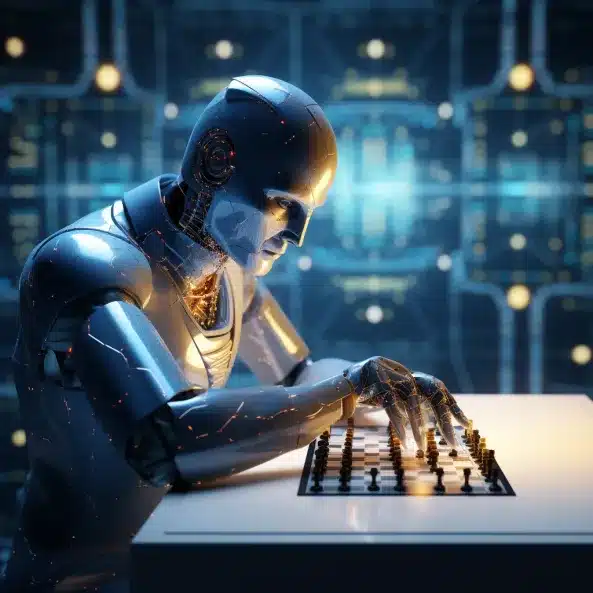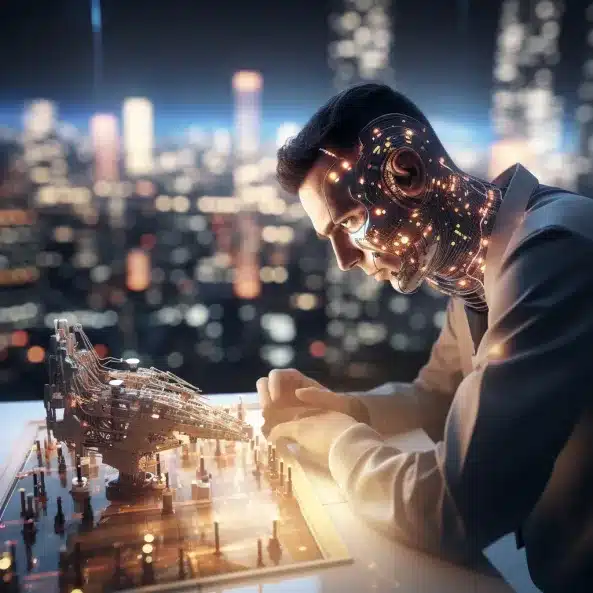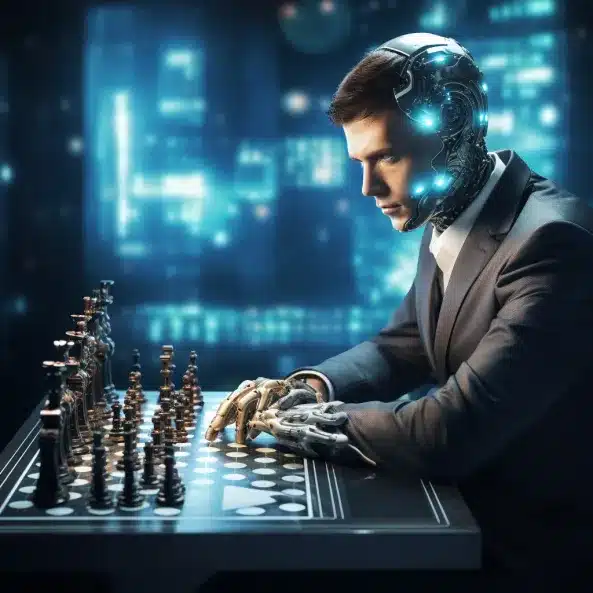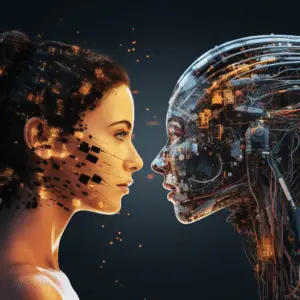
AI and Intellectual Property: Legal and Ethical Challenges
The Intersection of AI and Intellectual Property
Understanding Intellectual Property

Intellectual Property refers to the legal rights granted to creators or owners of original works. These rights include patents, trademarks, copyrights, and trade secrets.
The Role of AI in Intellectual Property
AI technologies like machine learning algorithms and natural language processing have significantly enhanced the creation, analysis, and protection of intellectual property. However, they have also raised concerns regarding ownership, infringement, and fair use.
Legal Challenges
-
- Patenting AI-generated inventions: AI’s ever-evolving capabilities make it challenging to determine whether an invention is the result of human ingenuity or AI algorithms. Establishing patent rights for AI-generated inventions needs clear legal frameworks.
-
- Infringement and liability: AI’s ability to generate content or replicate existing works raises questions about who should be held liable for copyright infringement in cases where AI is involved.
Ethical Considerations
-
- Bias and discrimination: AI systems can inadvertently perpetuate biases existing in training data, leading to discriminatory outcomes. Understanding and addressing these biases is crucial to ensure fairness in the intellectual property domain.
-
- Data privacy and security: AI requires vast amounts of data to operate effectively. Protecting individuals’ privacy and ensuring data security becomes paramount to prevent unauthorized access or misuse.
The Way Forward
Addressing the legal and ethical challenges at the intersection of AI and intellectual property requires collaborative efforts from lawmakers, industry experts, and AI developers. Regulatory frameworks should keep pace with technological advancements, enabling innovation while safeguarding intellectual property rights.
AI’s impact on intellectual property is undeniable. As AI continues to transform industries, understanding the legal and ethical complexities surrounding it is crucial for ensuring a fair and balanced approach to intellectual property rights in the digital age.
How does artificial intelligence (AI) impact intellectual property rights and ownership?
Artificial intelligence (AI) has a significant impact on intellectual property rights and ownership. Here are some key aspects:
1. Creation and Ownership: AI systems are capable of generating original content, inventions, or artwork. The question of ownership arises when an AI system autonomously creates something. In most cases, the copyright or patent rights are granted to the person or entity that owns or controls the AI system.
2. Copyright Infringement: AI systems can be used to infringe copyright by automatically generating or reproducing copyrighted works without authorization. This poses challenges in enforcing intellectual property rights and holding the AI system, its operator, or the user accountable.
3. Data Ownership: AI heavily relies on vast amounts of data for training and learning. The ownership and access to this data become crucial. Companies or individuals who possess the data required for AI training may have an advantage in terms of intellectual property rights and market competitiveness.
4. Patent Protection: Inventions made by AI systems can be eligible for patent protection. However, there are debates over whether AI can be listed as an inventor. Patent laws generally require inventors to be natural persons, raising questions of how to attribute inventorship when it comes to AI-generated inventions.
5. Performance and Trade Secrets: AI algorithms and models can be valuable trade secrets, providing a competitive advantage. Protecting the confidentiality of AI algorithms and preventing unauthorized access or use becomes crucial to safeguard intellectual property rights.
6. Ethical Considerations: The development and use of AI raise ethical concerns surrounding intellectual property. Ensuring fairness, avoiding bias, and respecting the rights of individuals when using AI systems becomes essential to maintaining intellectual property rights.
As AI continues to evolve, intellectual property laws and regulations will need to adapt to address the new challenges and opportunities it presents.
What are the legal implications and challenges surrounding AI-generated content and copyright?
Artificial intelligence (AI) technology generates content including music, artwork, and literature. However, AI-generated content poses legal issues and concerns for copyright. Here are several major concerns:
1. Copyright Protection Eligibility: Original human-created works are often accorded copyright protection. AI-generated content is autonomous, raising the question of whether it qualifies as an original work for copyright protection.
2. Determining Authorship: Copyright law often confers exclusive rights to the work’s authors. AI-generated work makes it difficult to determine the copyright owner because to the lack of human authorship. It is difficult to determine who should be credited with the rights and benefits of the work.
3. Ownership of AI-generated Work: When individuals or entities use AI technology, problems emerge about the ownership of the created content. Depending on aspects like AI technology ownership, human creator roles, and contractual agreements, ownership rights may differ.
4. Fair and Transformative Use: AI algorithms make use of copyrighted material to create new stuff. This may violate copyright rules, but the “fair use” theory allows limited use of copyrighted material for criticism, commentary, or parody. AI-generated material can be difficult to classify as fair or transformative.
5. Infringement and Liability: AI-generated content may accidentally violate copyright-protected works because to its ability to learn from prior material. Liability determination in AI cases is hard due to the need to differentiate between the culpability of the AI technology, its designers, and the users or deployers of the system.
To address these difficulties, legal frameworks must adapt to the changing landscape of AI-generated material. Courts and politicians may need to clarify rules, broaden authorship definitions, and provide guidance on copyright ownership and liability for AI-generated content.
What ethical considerations arise from the use of AI in creating, protecting, and exploiting intellectual property?

AI in intellectual property creation, protection, and exploitation raises ethical issues. Some factors to consider are:
1. Ownership and Attribution: AI systems may independently create intellectual property including artwork, music, and textual content. Determining ownership and attribution of these creations can be challenging. Who should be acknowledged as the creator and who should control the rights of AI-generated works are ethical problems.
2. Copyright Infringement and Plagiarism: AI systems can develop content by training on copyrighted materials. Possible plagiarism and copyright infringement may arise. Prohibiting copyrighted works from being accidentally or purposely reproduced by AI systems can be difficult.
3. AI systems may struggle to discern between copyright-protected items and those published under Creative Commons licenses or fair use provisions. Inappropriate use of protected materials or fair use rights may result in ethical difficulties.
4. Digital Rights Management: AI can bypass DRM systems or design tools for piracy or illicit access to copyrighted content. This covers the protection and enforcement of intellectual property rights in the digital world.
5. IP Exploitation and Misuse: AI can automate, enhance, or optimize the process of exploiting intellectual property for profit or other objectives. AI systems may be misused to violate IP rights or create misleading content.
To balance innovation with public rights, ethical considerations necessitate strong legislative frameworks, technical safeguards, and stakeholder participation.









You really make it seem really easy along with your presentation however
I to find this matter to be actually one thing that
I feel I’d never understand. It sort of feels too complicated and extremely vast for me.
I’m looking forward in your next post, I will try
to get the cling of it! Najlepsze escape roomy
You have noted very interesting details!
ps decent website..